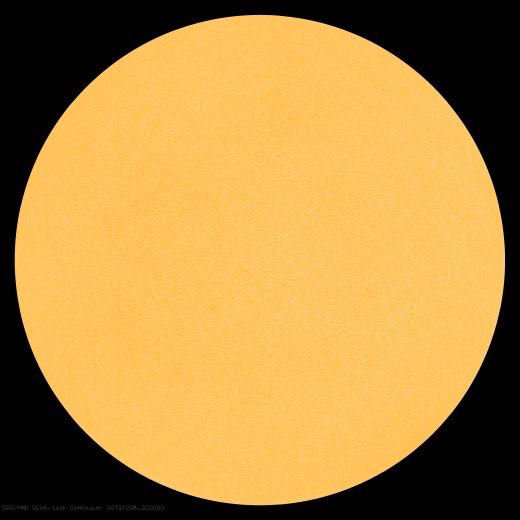(Source: SpaceWeather.com via Michael Bird)
ONE WEEK FROM A SPACE AGE RECORD: 2019 is about to set a Space Age record. So far this year, the sun has been blank (no sunspots) for 261 days, including the last 24 days in a row. If the streak continues for only 7 more days, 2019 will break the Space Age record for spotless suns.
The previous record-holder is the year 2008, when the sun was blank for 268 out of 365 days, making the Solar Minimum of 2008-2009 the deepest of the Space Age. Next weekend, barring a sudden profusion of sunspots, 2019 will move into first place.
Solar Minimum is a normal part of the 11-year sunspot cycle. The past two (2008-2009 and 2018-2019) have been long and deep, making them “century-class” Minima. To find a year with more blank suns, you have to go back to 1913, which had 311 spotless days.
What are the side-effects of Solar Minimum? On one hand, solar flares and geomagnetic storms subside, making it harder to catch Northern Lights at mid-latitudes. Space weather grows “quiet.” On the other hand, cosmic rays intensify. The sun’s weakening magnetic field allows more particles from deep space into the solar system, boosting radiation levels in Earth’s atmosphere. Indeed, this is happening right now with cosmic rays nearing a Space Age record.
Stay tuned for updates this week!


Just as the Parker solar probe collects significant data on the sun. Maybe they can send a nother probe to arrive at a sunspot maximum.
Just set up a QRP station for CW, SSB, guess it’s gonna’ be a challenge, hi hi. Even WWV sounds weak these days. Time to listen on the lower bands, e.g., AM BCB and longwave for some excitement.
I’ve done some pretty impressive QRP DX during this “spotless” period. Don’t let the sun stop you! 🙂
But you’re right: these are also great conditions for the lower bands!
Cheers,
Thomas
Naturally I became a ham in 2007 : ( : (